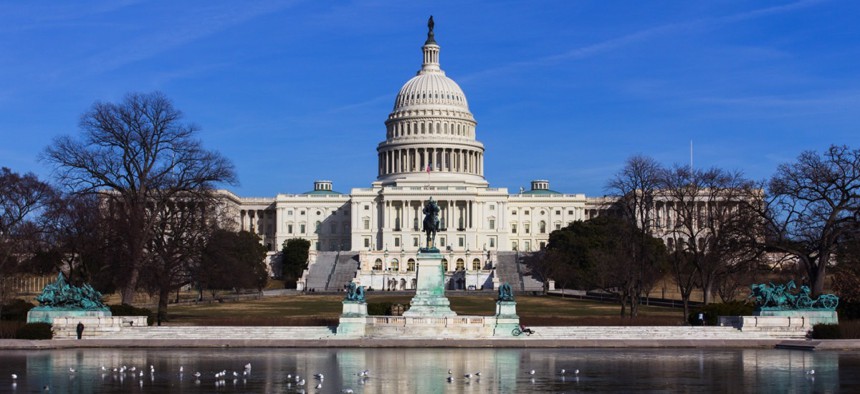The CHIP Reauthorization Saga Is Over But the Damage Has Already Been Done

The United States Capitol Building.
State officials aren’t likely to forget this episode of Congressional paralysis—and the precedent it set—any time soon.
After three tense days, Congress approved a temporary spending package to reopen the federal government. The continuing resolution, which President Trump signed Monday, also includes a six-year funding extension of the Children’s Health Insurance Program, which provides 9 million children and up to 370,000 pregnant women with health care coverage.
The funding for the program had expired 114 days earlier, at the end of September 2017.
In the months that followed, the Centers for Medicare and Medicaid Services freed up a pot of unspent CHIP funds from the previous fiscal year and had been doling out money to states to keep the individual state programs afloat. Likewise, Congress approved temporary spending along the way to prevent states from having to suspend their CHIP operations.
Despite these stop-gap funds, the situation in many parts of the country looked dire.
As many as 10 states were expected to completely exhaust their funding by the end of this month—with some a risk of running of out money on Jan. 19.
The months of uncertainty led to tough conversations in state agencies across the country. After much deliberation, Colorado and Virginia chose to notify families that without congressional action their CHIP coverage might end. Alabama announced it would freeze CHIP enrollment, but then backtracked on that decision when temporary congressional funding was agreed upon in December.
The states that had warned families of the risk that they might lose their health coverage are now telling them not to worry, their coverage is safe. But in many ways the conclusion of this saga is bittersweet. Yes, the standoff over CHIP is over, but the damage of this congressional paralysis had already been done.
CHIP is run as a partnership between the federal government and the states, and over the course of these last few months, officials have seen their trust in their federal partners deeply shaken.
Speaking with Route Fifty in early October, Emily Piper, commissioner of the Minnesota Department of Human Services—one of the earliest states to reach critical funding levels—said that the whole experience made her question the federal government’s reliability.
“We rely on a functioning federal partner—if that’s HHS, or if it’s CMS, or if it’s Congress—to act in a manner that allows us to run the programs that we’re responsible for running in an effective and efficient manner in compliance with state and federal law,” Piper said. “And when our federal partners don’t perform the basic functions necessary for us to continue to operate these programs for the benefit of people, there’s consequences to that. And it creates a lot of uncertainty in states, and a lot of concern about the reliability of our federal partners that we work with so often and rely on.”
Linda Nablo, the chief deputy director of the Virginia Department of Medical Assistance Services spoke with Route Fifty in late November. At the time, she was tasked with coming up with an answer to a seemingly impossible question: whether to keep parents calm and in the dark, or terrify them by writing them a letter telling them their child’s coverage could be eliminated.
But, what scared and frustrated Nablo the most wasn’t the letter, or the bureaucratic time and effort that went into preparing the state for the worst possible scenario. No. What scared Nablo was the precedent this whole process set.
“If this is now going to become more the norm, that you can let the deadline go, that you can let federal funds wind down and as long as you catch it before the very last dollar runs out, that that’s OK, and states will just bear it, and deal with it, that’s going to be a frightening scenario in a lot of ways,” Nablo said.
PREVIOUSLY on Route Fifty:
Quinn Libson is a Staff Correspondent for Government Executive’s Route Fifty and is based in Washington, D.C.
NEXT STORY: #MeToo Movement Has Lawmakers Talking About Consent






